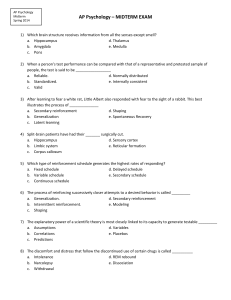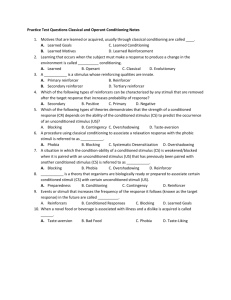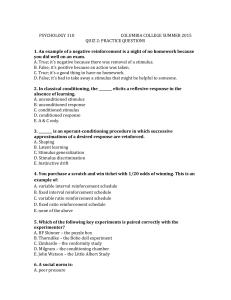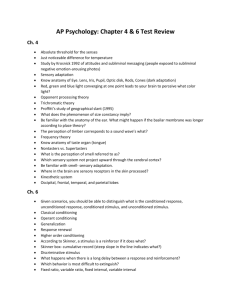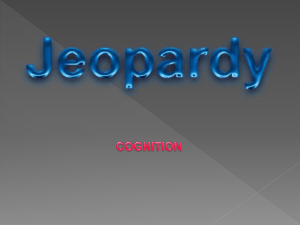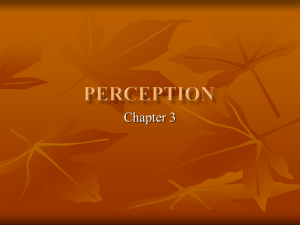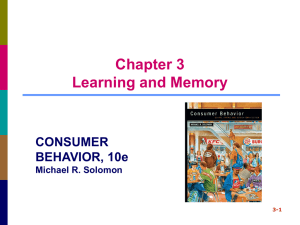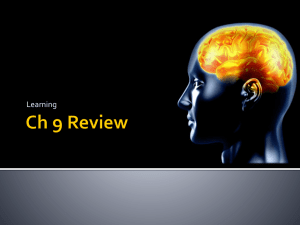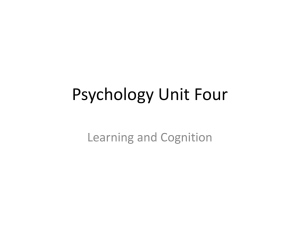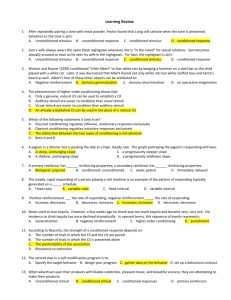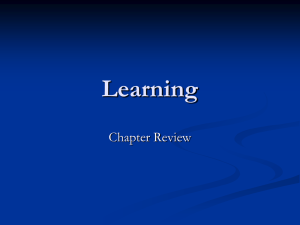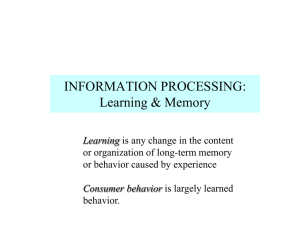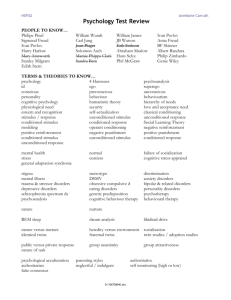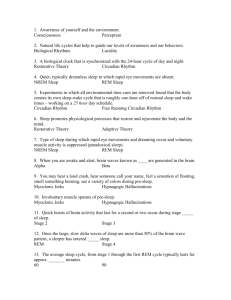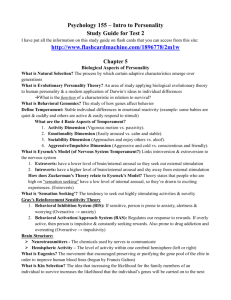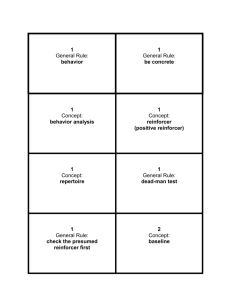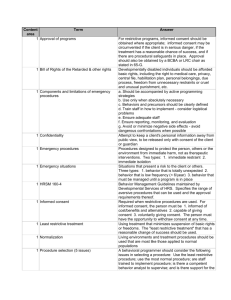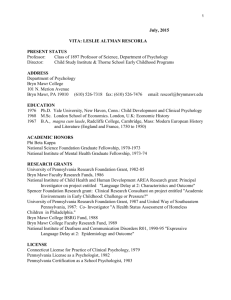Unit 6 PRACTICE TEST
advertisement
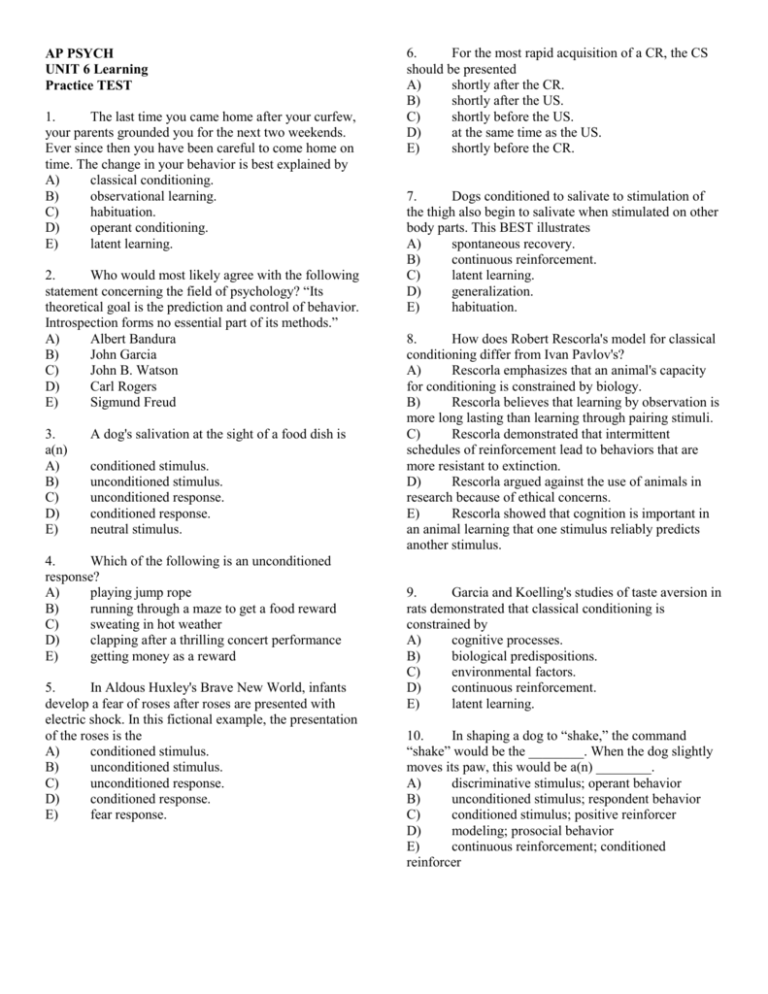
AP PSYCH UNIT 6 Learning Practice TEST 1. The last time you came home after your curfew, your parents grounded you for the next two weekends. Ever since then you have been careful to come home on time. The change in your behavior is best explained by A) classical conditioning. B) observational learning. C) habituation. D) operant conditioning. E) latent learning. 2. Who would most likely agree with the following statement concerning the field of psychology? “Its theoretical goal is the prediction and control of behavior. Introspection forms no essential part of its methods.” A) Albert Bandura B) John Garcia C) John B. Watson D) Carl Rogers E) Sigmund Freud 3. a(n) A) B) C) D) E) A dog's salivation at the sight of a food dish is conditioned stimulus. unconditioned stimulus. unconditioned response. conditioned response. neutral stimulus. 4. Which of the following is an unconditioned response? A) playing jump rope B) running through a maze to get a food reward C) sweating in hot weather D) clapping after a thrilling concert performance E) getting money as a reward 5. In Aldous Huxley's Brave New World, infants develop a fear of roses after roses are presented with electric shock. In this fictional example, the presentation of the roses is the A) conditioned stimulus. B) unconditioned stimulus. C) unconditioned response. D) conditioned response. E) fear response. 6. For the most rapid acquisition of a CR, the CS should be presented A) shortly after the CR. B) shortly after the US. C) shortly before the US. D) at the same time as the US. E) shortly before the CR. 7. Dogs conditioned to salivate to stimulation of the thigh also begin to salivate when stimulated on other body parts. This BEST illustrates A) spontaneous recovery. B) continuous reinforcement. C) latent learning. D) generalization. E) habituation. 8. How does Robert Rescorla's model for classical conditioning differ from Ivan Pavlov's? A) Rescorla emphasizes that an animal's capacity for conditioning is constrained by biology. B) Rescorla believes that learning by observation is more long lasting than learning through pairing stimuli. C) Rescorla demonstrated that intermittent schedules of reinforcement lead to behaviors that are more resistant to extinction. D) Rescorla argued against the use of animals in research because of ethical concerns. E) Rescorla showed that cognition is important in an animal learning that one stimulus reliably predicts another stimulus. 9. Garcia and Koelling's studies of taste aversion in rats demonstrated that classical conditioning is constrained by A) cognitive processes. B) biological predispositions. C) environmental factors. D) continuous reinforcement. E) latent learning. 10. In shaping a dog to “shake,” the command “shake” would be the ________. When the dog slightly moves its paw, this would be a(n) ________. A) discriminative stimulus; operant behavior B) unconditioned stimulus; respondent behavior C) conditioned stimulus; positive reinforcer D) modeling; prosocial behavior E) continuous reinforcement; conditioned reinforcer 11. Blake is a carpet installer who wants to be paid for each square foot of carpet he lays rather than with an hourly wage. Blake prefers working on a ________ schedule of reinforcement. A) fixed-ratio B) fixed-interval C) variable-interval D) variable-ratio E) intermittent-interval 12. Glancing at the television in the next room in hopes of seeing the beginning of the evening news is likely to be reinforced on a ________ schedule. A) intermittent-variable B) fixed-ratio C) variable-interval D) variable-ratio E) fixed-interval 13. A choppy stop-start pattern of operant responding is associated with the ________ schedule of reinforcement. A) fixed-ratio B) fixed-interval C) variable-ratio D) variable-interval E) continuous-immediate 14. The introduction of a pleasant stimulus is to ________ as the withdrawal of a pleasant stimulus is to ________. A) positive reinforcer; negative reinforcer B) acquisition; extinction C) reinforcement; punishment D) generalization; discrimination E) primary reinforcer; secondary reinforcer 15. Revoking the driver's license of a reckless driver is intended to serve as a A) negative reinforcement. B) positive reinforcement. C) negative punishment. D) positive punishment. E) punishing reinforcer. 16. Which of the following become active both when people watch an action being performed and when they perform that action themselves? A) cognitive maps B) fixed-ratio schedules C) mirror neurons D) operant chambers E) biofeedback systems 17. Bandura's Bobo doll experiment demonstrated that the power of observational learning depends on what? A) whether the participant is directly rewarded or punished for behaving B) whether violence is performed C) whether the conditioned stimulus precedes the unconditioned stimulus D) whether we see the people as similar to us E) the power of extinction to overcome conditioning 18. Experiments suggest that children exposed to a model who says one thing and does another will A) ignore both what the model says and does. B) ignore what the model does but talk in ways consistent with what the model says. C) ignore what the model says but act in ways consistent with what the model does. D) talk in ways consistent with what the model says and act in ways consistent with what the model does. E) talk in ways that contradict the model in order to match the observed behavior. 19. The violence-viewing effect is especially pronounced when the observed violence A) causes visible harm. B) goes unpunished. C) seems unjustified. D) is committed by an unattractive person. E) is committed by children. 20. After prolonged exposure to television violence, viewers became more indifferent to violence when later viewing a brawl, whether on TV or in real life. This finding best illustrates A) latent learning. B) spontaneous recovery. C) extinction. D) instinctive drift. E) desensitization. Answer Key 1. 2. 3. 4. 5. 6. 7. 8. D C D C A C D E 9. 10. 11. 12. 13. 14. 15. 16. 17. 18. 19. 20. B A A E B C C C D D B E
